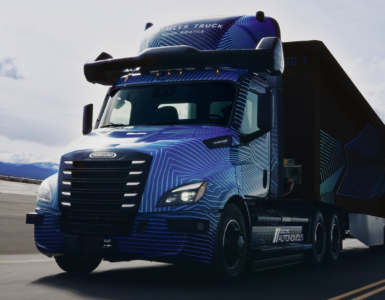Batteries Ablaze in New York City.
The streets of NYC are abuzz with e-bikes and scooters.
Micro-mobility transport provides New Yorkers with a more convenient and cost-effective means of earning a living, and this trend shows no signs of slowing down. Over 60,000 food delivery workers rely on app-based platforms and use e-bikes instead of cars to transport food and other goods across the city.
The online grocery industry is expected to grow at a projected rate of $740.88 billion from 2022 to 2027, and the micro-mobility market is estimated to grow from USD 3.4 billion in 2022 to USD 6.1 billion by 2027.
🔥 What about we co-host a webinar? Let's educate, captivate, and convert the battery economy!
Batteries News is the global go-to online magazine for the battery industry, we can help you host impactful webinars that become a global reference on your topic and are an evergreen source of leads. Click here to request more details
Micro-mobility is hot in NYC, but something else is hot, and that’s the batteries within these e-bikes and e-scooters that are catching on fire. Last year, NYC experienced 216 incidents of battery-related fires, resulting in 147 injuries and six deaths, which is a significant increase from the 104 fires, 79 injuries, and four deaths recorded in 2021.
New York City working for safety
The NYC Council created and passed a series of bills in July of 2021 to expand electric bicycle and scooter use in the city. The bills outlined rules for e-bike and e-scooter use, such as speed limits and helmet use rules. A new permit system was also created for companies to operate shared e-scooters.
Mayor, Eric Adams, has recently unveiled an NYC Streets Plan that allocates $904 million over the next five years to build 250 miles of protected bike lanes by the end of 2026. In addition, the Mayor has pledged to strengthen 20 miles of these bike lanes with concrete barriers.
In March, the NYC Council approved a set of local bills, mandating that all electric mobility devices rented, sold, or leased within the city must have UL certification. Failure to comply with the regulations may result in a fine of $1,000 for offenders.
What is the root cause of these battery fires?
- Certification is an important factor in ensuring the safety of micro-mobility users, as many individuals cannot afford the high cost of quality e-bikes and often adopt unsafe or unproven technologies. At a minimum, battery cells used in e-bikes should have UL 1642, IEC 62133-2 and DOT/UN 38.3 certification marks. The battery packs should also have environmental certifications such as UL 2271, IEC 607300-1 and EN 50604-1. Even with these basic certifications, real-world environmental conditions can still lead to battery fires if using lithium-ion chemistry.
- The widespread use of standard lithium-ion batteries to power micro-mobility vehicles such as e-scooters and e-bikes contributes to the problem of battery fires, as this technology has a history of thermal runaway incidents and fires. These battery fires can also occur if not properly managed at the end of their lifecycle at recycling centers.
- Batteries can degrade over time, especially in the busy streets of NYC, where they can get “beat up” in day-to-day use along with varying temperatures that can be extreme. There are limits to the usable cycle lifes with lithium-ion batteries, and pushing that boundary without proper maintenance and care can increase fire risk.
- Delivery workers often have 12-16 hour days but are limited with batteries only lasting 5-7 hours. This induces the need to battery swap. Not only can this cause physical damage to the battery, it can also be dangerous if the battery’s voltage, capacity, or chemistry does not match the bike’s requirements and can lead to short-circuiting. It also exposes parts of the battery electronics to things like salt spray during the winter.
- Many battery fires occur during overnight charging, as overcharging can lead to a buildup of heat and pressure within the battery, resulting in swelling, leakage and explosion.
A safer alternative
Lithium-titanate (LTO) battery chemistry is proven resistant to fires, and it is a self-healing battery that can prevent thermal events under extreme conditions. There are many advantages to using lithium-titanate batteries for micro-mobility.
Fast Charging: LTO batteries allow for quick charging, eliminating the need for dangerous battery swapping, which is beneficial for users who need to use electric personal mobility devices for extended periods, especially in NYC, where quick charging is often necessary.
Durability: LTO batteries can be charged and discharged up to 15,000 cycles (equating to a twenty-plus-year lifespan) and can withstand punctures, short-circuits, and physical damage without sparking a fire.
Fire Resistance: LTO battery’s core lithium titanium nano-crystals will not go into thermal runaway from overcharging compared to traditional lithium-ion batteries. They also have the ability to self-heal, changing from a conductor to a resistor in the event of internal short circuits.
Thermal Adaptability: LTO batteries can operate safely in a wide range of temperatures, making them ideal for cities like New York.
Swapability: LTO batteries can adapt to a variety of vehicles and voltages that allow an easy swap from any lithium-ion battery without changing hardware in the operated device.
Proven: LTO batteries are already certified and have been used by the Department of Defense for many years, making them a tested and reliable option for micro-mobility.
A Battery for a New Era
LTO chemistry is available and ready for the micro-mobility space, but it doesn’t stop there. LTO batteries can be an easy swap for lithium-ion, serving as a universal adapter across multiple consumer goods, including home appliances, fitness equipment, and more. As the world electrifies, LTO is shaping up to fundamentally change the battery landscape.
About the Authors
Charlie Welch is the CEO and Co-founder of ZapBatt, a battery provider for various markets, including mobility, small infrastructure, and consumer products. As an aerospace engineer, Charlie Welch was a lead researcher at defense and technology companies testing, and optimizing a variety of battery chemistries.
Amiad Zionpur is the COO of ZapBatt and has been involved in the micro-mobility space for many years. He served as a senior leader at Zagster – a leading fleet management and bike sharing startup to brands such as Spin, Link and Uber and he is also an advisor to multiple startups within micro-mobility in the US and beyond.
READ the latest Batteries News shaping the battery market
Batteries Ablaze in NYC, March 30, 2023








